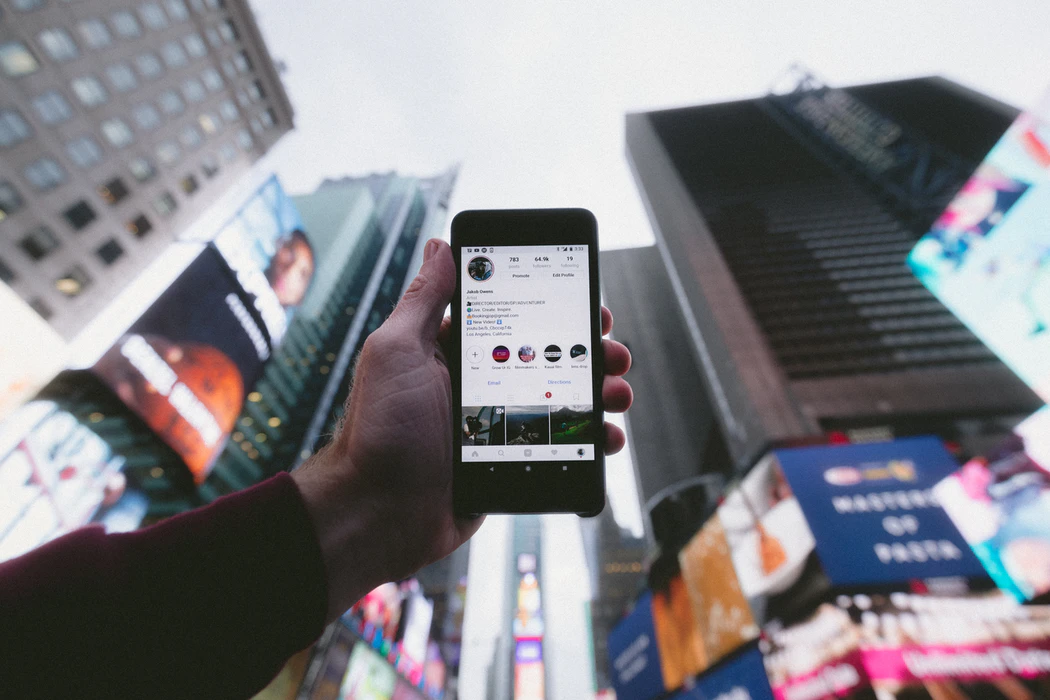In this day and age practically everyone lives on their phones. The Social Dilemma discusses how that is not entirely the consumer’s fault. (Photo used with permission of Jakob Owens)
A lot of good has come in the last 20 years because of the internet, especially social media platforms. But according to The Social Dilemma, not nearly enough people are realizing the dire consequences of the social platforms everyone seems to love so much.
The Social Dilemma is a Netflix documentary released on September 9, 2020. The film was directed by Jeff Orlowski to open the publics’ eyes as to how social media is subtly destroying society.
The documentary tells the story through two points of view. It switches between interviews with former key social media employee and a fictional family, who represent what the employees are talking about in a real-world scenario.
The family members struggle with problems created by social media. The youngest daughter, Isla, struggles with self-image due to apps like Snapchat which create unrealistic beauty standards through their filters. There is also the son, Ben, who struggles with political polarization as a result of an algorithm tailored to change his mindset.
The first thing the former tech employees talk about is how the founders of these platforms designed social media to be a force of good. Employees said that the idea of likes on photos was purely made to create positivity in the community. But, unfortunately, when creates a platform like Facebook, it will rarely turn out as intended. Now, Facebook has been used by other countries to convince voters to change their vote and for hate groups to push their messages globally.
A big issue presented in the film is mental health. Studies have shown a rise in mental health issues in Generation Z. “A whole generation is more anxious, more fragile, more depressed,” said Jonathan Haidt, a social psychologist during his interview. A large part of this problem began with platforms such as Instagram and Snapchat who over use filters and photo editing. The film even names a disorder called Snapchat dysmorphia where teenagers have been wanting to get plastic surgery to look more like their filtered selfies.
Another large issue presented is that social media creates misinformation. According to multiple interviewees, social media will mostly show posts about what the platform believes the user likes. When a user only likes very specific or one-sided material, the platforms will start showing less and less of what another perspective believes. This means that if a user will not like and follow people with different opinions, social media will not bother showing them.
The former employees say that this misinformation has created political polarization and general discourse around the world. Social media has been used to radicalize multiple hate groups. It has also created a huge divide between America’s political parties, which is shown in The Social Dilemma with this visual from the Pew Research Center.
None of the interviewees fault the companies for these problems, instead they fault the business model. According to the film, social media companies have three main goals: engagement, growth, and advertising.
But, for these goals to be met, they have to change how your brain works.
Whenever someone likes a post or leaves a positive comment, the posts creator is immediately happy, because they have been validated where they never would have cared before. Tristan Harris and Joe Toscano also talk about when the feeling when a page is refreshed and something new appears, calling it “positive intermittent reinforcement.”
The documentary ends with eerie predictions from each of the interviewees if the world continues on its current track. “If we go down the current status quo for, let’s say, another 20 years…we probably destroy our civilization through willful ignorance,” said Jaron Lanier.
Fortunately, the film does finish with many of the former employees saying the future could be saved if everyone bands together for change.
This film doesn’t leave a lot of positivity around the tech industry, despite claiming that it can change. It leaves a dark cloud around what seems to such an amazing and useful industry. And the worst part about the film is almost everyone already knew a lot of the basic information, they just were not paying enough mind to it.
Everyone knows their data is being tracked but likely did not know the extreme extent it was taken to. It creates questions many thought they had the answer to. It wouldn’t be shocking if the film made many limit their screen time or delete their social media.
Overall, this film so full of information that not everything could be covered in this article. But, if anyone is interested in forming their own opinion or just learning more, they should watch the film on Netflix. And if by any chance a Netflix account is not accessible, check out The Social Dilemma website for more information.

Hi! My name is Cassidy and I am a staff writer for The Mycenaean. I am also a member of Book Club and Tech Theatre.

Leave a Reply